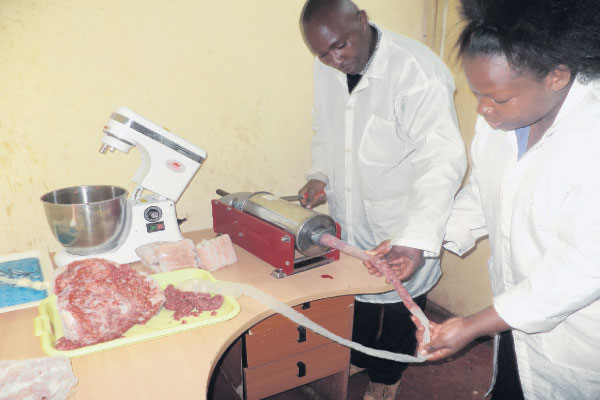Isaac Muigai pushes a sharp knife back and forth, cutting through rabbit meat as Lilian Kanyingo holds it gently.
They are deboning the rabbit before mincing its flesh for sausages, samosas and kebabs at the company they own and jointly run with Peter Njoroge in Kikuyu, Kiambu County.
Their firm, Pillar Group Limited, buys the animals from farmers all over the country, and so far, it has direct contact with 382 of them.
The firm trains the farmers in rabbit keeping, including how to construct cages, feeding, breeding, handling and care and later buys the animals.
“We also tell them where to source the fastest-maturing breeds, best feeds, disease prevention and treatment,” Lilian, 27, who is in charge of training, says.
The three have a rich experience in rabbit-keeping, having reared the animals before turning to value addition due to exploitation by middlemen.
Muigai, Njoroge and Lilian met by chance during an agricultural exhibition in Wangige, Kiambu, in 2010, and formed the company to offer farmers a market.
Their aim was to add value to rabbit meat and enable farmers earn more from their investment.
“Then, a rabbit weighing at least 4kg would go for Sh200. We started buying each kilo at Sh500, which saw the same rabbit going for Sh2,000. This is after training our farmers on how to raise the animals free of charge,” Lilian says.
They contributed Sh40,000 each from their savings to start the business.
STUFFING MACHINE
“In addition, we borrowed Sh215,000 from a bank that we used to buy sausage-making equipment, which included a mixer and stuffing machine. By the end of the year, we had repaid the loan.”
They learned how to make rabbit meat products in a training organised by the Ministry of Agriculture in Kikuyu.
The company’s products have been flying off supermarket shelves and currently, Pillar Group Limited is facing a shortage of rabbits.
“Supermarkets in Nairobi have asked us to supply them (with sausage) but we cannot slaughter 200 rabbits daily as they requested since we don’t have enough. We slaughter 100 rabbits (per day),” Muigai says.
The firm sells a sausage at Sh50, kebab at Sh40 and a samosa sells for Sh30.
“Nothing goes to waste as we sell the skin to a group in Nyeri that makes shoes. We sell each rabbit skin at Sh200.”
Presently, the firm buys rabbits from farmers across the country provided the animals are in good health.
Pillar Group Limited recommends hybrid rabbits such as New Zealand White, California White, Chinchilla and the Checkered Giant because they give better yields.
The firm’s brisk business has enabled the three investors to buy a vehicle that they use to buy and transport rabbits from all over the country.
During the Seeds of Gold this week, farmers kept inquiring about care for their animals— like Ruth Wanjiku, 35, called several times seeking a bloat remedy. Later, we visited her farm in Kinoo, Kiambu County.
“Bloat is my main challenge in this venture. I am able to control diseases like coccidiosis and pneumonia. However, it is important to be close to your animals. Even if you have employed a farmhand, you should be diligent enough,” she told us.
BEAUTIFUL ANIMALS
Ruth has 34 cages on an 8×4-metre parcel. Each cage shelters between one and 10 rabbits depending with age and sells them at four months.
She feeds the beautiful animals on greens, hay and pellets twice a day — in the morning and evening.
“I give an adult rabbit 130 grammes of pellets per day and 60 grammes to the young ones. You increase the food as they grow.”
James Juma, a veterinary officer working with Mount Kenya East Pilot Animal Health Project, says rabbit farmers should ensure the animals are not over-fed.
“You should not give more feed than is recommended because if they are overweight, they neither conceive nor serve,” he says.








